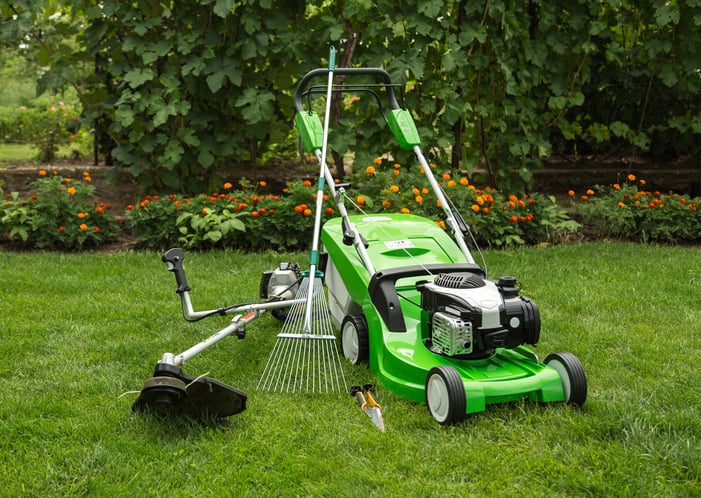No matter what type of grass you have, the growing season is upon us. Soil temperatures are warming up and it’s about time to start mowing the lawn again (if you haven’t already).
So, in order to help you ensure you have a healthy lawn, let’s go over some late spring lawn care tips you can use.
Clean Up
If you haven’t had the chance to do a spring clean-up in April, now is the time to get to it. You can start by removing any leaves, stones, and twigs that might be on your lawn. Walk your entire yard and take a good look at what may have blown in over the winter or the early spring.
Get out the rake and use it to remove any dead grass or thatch. Remember to be gentle. Your grass may still be a bit tender at this time and therefore, more prone to injury. Raking helps prepare the ground and promotes the absorption of fertilizer.
Lawn Mowing in May
In general, You shouldn't mow your grass lower than three inches. That’s why it's best to wait until your lawn reaches at least 3.5 inches. Cutting it too low can cause stress to the roots of your grass blades, which will remain delicate for several weeks.
Seed Your Lawn (If Necessary)
If your lawn is not performing up to your expectations, you can re-establish a healthier, better-looking lawn by overseeding it. The best time to over-seed an existing lawn is from late summer to early fall, but it can still be a success when done in spring. Plant grass seed in bare patches in your lawn or wherever growth is sparse.
Do a Soil Test
Spring is the best time to test your yard's pH to determine if your soil is too acidic. You may also want to take a look at soil compaction. If your grass can’t get the nutrients it needs because of compacted soil, you may have to consider core aeration at some point.
Inspect Your Sprinkler System
Make sure you open the main valve slowly so that any air trapped in the pipes can be released through the sprinkler heads. Check all the zones to see if there are any leaks or damaged lines.
Inspect the stations as some may have moved over the winter months. Set your program for the controller.
Continue Fertilizing Your Lawn
The fertilizing process begins in March, but it’s not a” one-and-done” process. Fertilizing just before the heat of summer begins and after your grass is thriving is ideal. Feeding your lawn at the beginning of spring and again in late spring prepares your grass for summer.
But be sure to use a slow-release treatment to prevent burn. A polymer-coated slow-release fertilizer can feed the grass for up to 12 weeks. But if you do happen to over-fertilize, water your lawn generously.This is just before the heat of summer begins and after your grass is thriving. Feeding your lawn at this point prepares the grass for summer.
But be sure to use a slow-release treatment to prevent burn. A polymer-coated slow-release fertilizer can feed the grass for up to 12 weeks. But if you do happen to over-fertilize, water your lawn generously.
Don't Forget Weed Control
As soil temperatures grow warmer, perennial broadleaf weeds like broadleaf plantain, crabgrass, and dandelions begin to germinate. Treatments are most effective when done in the pre-emergent stage. Pre-emergents can establish a chemical barrier that prevents these types of weeds from growing.
If you miss the cycle, try post-emergent treatments and the old-fashioned method of pulling them out by hand.
Let Lush Lawn Help
By following these lawn care tips for healthy, green grass you’ll make your home the envy of the neighborhood. But it’s only the start. Having a well-qualified team of experienced experts will take your lawn to the next level.
We’ve developed an incredibly effective lawn care program at Lush Lawn. Our knowledgeable lawn care professionals administer each part of the program in stages.
We understand that every lawn is unique. We take into account different grass types (like cool-season grasses that are typically found in Michigan) and soil conditions. We pair our standard lawn care packages with a comprehensive list of specialized local lawn care services to cater to your lawn’s every need.
If you’re interested in learning more about how we can help your lawn thrive, contact us today.
